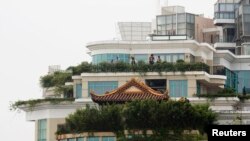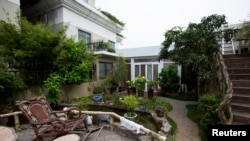An elaborate temple-like structure perched on an apartment block in southeastern China is an illegal hazard that should be torn down, residents say. But they may not be as lucky as opponents of a lavish rooftop villa in Beijing.
The temple in Shenzhen is believed to have been on the roof for about seven years but the complaints have hit the spotlight only after a doctor in Beijing was given 15 days to demolish his 800-square-meter (8,600-square-foot) house and garden built illegally atop a 26-story apartment block.
Although the roof of the building in Shenzhen is supposed to be a public space, a fingerprint-activated lock stops others from accessing it, according to media reports.
Chen Jiatao, chairman of the complex's housing management committee, said the temple's owner must resolve the matter by opening the space to other residents but he seemed to hold out little hope.
“I once spoke with the past chairman, who was here for seven years,” Chen told Reuters Television. “He said this to me: 'Oh my, don't you know? This person is an official, he has friends in high places.' So it's useless.”
A disregard for laws and regulations by the rich and well-connected is a source of discontent among many Chinese.
The temple and inaccessible rooftop have raised concerns about safety. For residents on higher floors, the roof would be the main escape route in case of fire, while the added weight from the illegal structure could threaten the building's stability, media reports say.
Apartments in the building sell for around 30,000 yuan ($4,900) per square meter and the rooftop itself is worth more than 15 million yuan ($2.45 million), according to the South China Morning Post. ($1=6.1234 Chinese yuan)
The temple in Shenzhen is believed to have been on the roof for about seven years but the complaints have hit the spotlight only after a doctor in Beijing was given 15 days to demolish his 800-square-meter (8,600-square-foot) house and garden built illegally atop a 26-story apartment block.
Although the roof of the building in Shenzhen is supposed to be a public space, a fingerprint-activated lock stops others from accessing it, according to media reports.
Chen Jiatao, chairman of the complex's housing management committee, said the temple's owner must resolve the matter by opening the space to other residents but he seemed to hold out little hope.
“I once spoke with the past chairman, who was here for seven years,” Chen told Reuters Television. “He said this to me: 'Oh my, don't you know? This person is an official, he has friends in high places.' So it's useless.”
A disregard for laws and regulations by the rich and well-connected is a source of discontent among many Chinese.
The temple and inaccessible rooftop have raised concerns about safety. For residents on higher floors, the roof would be the main escape route in case of fire, while the added weight from the illegal structure could threaten the building's stability, media reports say.
Apartments in the building sell for around 30,000 yuan ($4,900) per square meter and the rooftop itself is worth more than 15 million yuan ($2.45 million), according to the South China Morning Post. ($1=6.1234 Chinese yuan)

